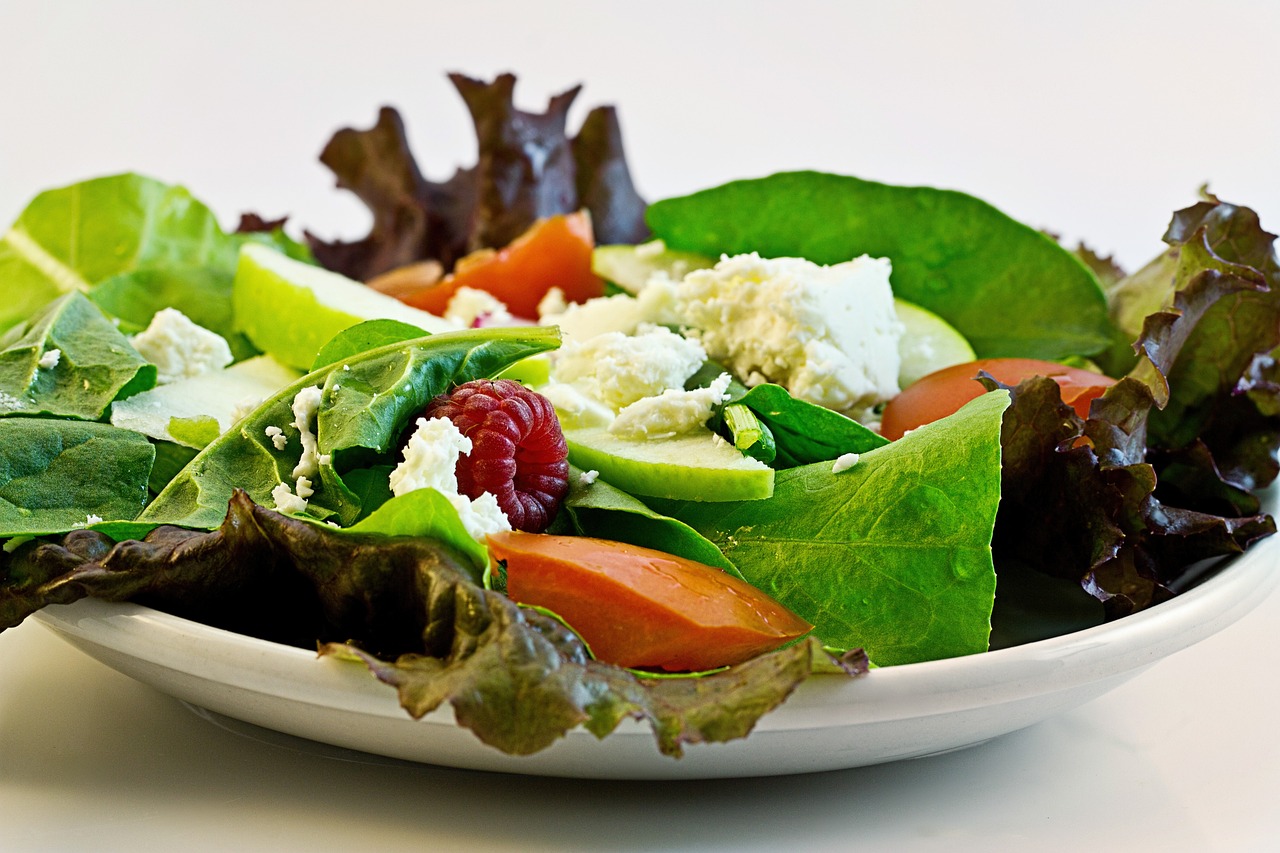The Benefits of Eating Salad Before a Meal
Adding a fresh, nutrient-packed salad to your mealtime routine can offer a plethora of health benefits beyond just adding color to your plate. Consuming a salad before your main course can enhance your overall nutrition, promote weight management, and support digestive health. Let's explore the compelling reasons why incorporating a salad before a meal is a beneficial dietary practice.
1. Enhances Nutrient Intake
Salads are typically composed of a variety of vegetables, leafy greens, and sometimes fruits, all rich in essential vitamins, minerals, and antioxidants. By starting your meal with a salad, you ensure that you begin with a nutrient-dense option, providing vital nutrients like vitamin C, vitamin K, folate, potassium, and fiber.
2. Boosts Fiber Consumption
Fiber is crucial for digestive health and promotes a feeling of fullness, which can aid in portion control during the main course. Salads containing ingredients such as leafy greens, carrots, cucumbers, and bell peppers are excellent sources of dietary fiber, supporting regular bowel movements and overall gut health.
3. Contributes to Hydration
Many salad ingredients, such as lettuce, cucumbers, and tomatoes, have high water content, contributing to hydration. Consuming a hydrating salad before a meal can help prevent overeating by satisfying thirst cues and promoting a feeling of fullness.

4. Supports Weight Management
Starting a meal with a salad can aid in weight management. The fiber and water content in salads help fill you up with fewer calories, potentially reducing overall calorie intake during the main course. This can support weight loss or weight maintenance goals when combined with a balanced diet and healthy lifestyle.
- Starting a meal with a salad can aid in weight management by promoting satiety and reducing calorie intake.
- Salads are low in calories but high in volume due to their fiber and water content, which helps you feel full without consuming excess calories.
- Fiber-rich vegetables and leafy greens add bulk to your meal, contributing to a sense of fullness and potentially reducing the amount of food consumed during the main course.
- This can support weight loss or weight maintenance goals by promoting portion control and reducing overall calorie intake.
Promotes Satiety and Hydration:
- The water content in salads, from ingredients like lettuce, cucumbers, and tomatoes, contributes to hydration and helps fill you up with minimal calories.
- Foods with high water content can satisfy thirst cues, reducing the likelihood of overeating during the main meal.
- Staying hydrated is important for overall health and can aid in weight management by preventing confusion between thirst and hunger signals.
Nutrient-Dense and Low-Calorie:
- Salads are nutrient-dense, providing essential vitamins, minerals, and antioxidants necessary for overall health.
- Prioritizing nutrient-dense foods like vegetables and leafy greens in a salad ensures that you consume vital nutrients while managing calorie consumption.
- Opting for salads with a variety of colorful vegetables and incorporating lean protein sources (e.g., grilled chicken, chickpeas) can enhance nutritional value and promote satiety.
Part of a Balanced Weight Management Plan:
- While salads can be beneficial for weight management, their effectiveness depends on overall dietary habits and lifestyle.
- Incorporating salads into meals is most effective when part of a balanced diet that includes a variety of nutrient-rich foods.
- Combining salad consumption with regular physical activity supports a healthy weight management plan and overall wellness.

5. Promotes Blood Sugar Control
Including vegetables like leafy greens and non-starchy vegetables in salads can help regulate blood sugar levels. These low-glycemic index foods release sugar into the bloodstream more slowly, preventing rapid spikes in blood sugar levels after eating.
6. Aids in Digestion
Raw vegetables and leafy greens contain enzymes that aid in digestion. Consuming a salad before a meal can stimulate the production of digestive enzymes, promoting efficient digestion and nutrient absorption from the entire meal.
7. Enhances Meal Enjoyment
Salads offer a vibrant array of colors and textures, making meals visually appealing and enjoyable. Adding a variety of vegetables, nuts, seeds, or fruits to your salad can enhance the flavor profile of your meal while providing essential nutrients.
8. Encourages Mindful Eating
Eating a salad before the main course encourages mindful eating by slowing down the pace of your meal. Taking time to savor and appreciate the flavors and textures of the salad can promote greater awareness of hunger and fullness cues, helping prevent overeating.
How to Maximize Salad Consumption Before Meals
To maximize the benefits of eating salad before a meal, consider the following tips:
- Choose a variety of colorful vegetables and leafy greens for your salad.
- Include a source of protein (e.g., grilled chicken, chickpeas, tofu) to make the salad more satisfying.
- Dress salads with healthy fats like olive oil or avocado to enhance nutrient absorption.
- Minimize the use of high-calorie toppings like cheese or creamy dressings.
- Enjoy salads with a balance of flavors and textures to make them more appealing.
In summary, incorporating a nutritious salad before your meal can significantly contribute to your overall health and well-being. From boosting nutrient intake to supporting weight management and digestion, salads offer numerous benefits that can enhance your dietary habits and promote a healthier lifestyle.
Customize your salads with a variety of ingredients to keep them interesting and satisfying. By making salads a regular part of your meal routine, you can harness the power of fresh, wholesome ingredients to optimize your health and well-being.

FAQ: The Benefits of Eating Salad Before a Meal
1. Why is it beneficial to eat a salad before a meal?
- Incorporating a salad before a meal offers several advantages:
- It increases your intake of essential nutrients, including vitamins, minerals, and antioxidants.
- Salads are rich in fiber, which promotes digestive health and helps you feel full with fewer calories.
- Starting with a salad can support weight management by reducing overall calorie intake during the main course.
2. How does eating a salad before a meal aid in weight management?
- Salads are low in calories but high in volume due to their fiber and water content.
- Fiber-rich vegetables and leafy greens add bulk to your meal, promoting satiety and reducing the amount of food consumed during the main course.
- This can help control portion sizes and contribute to achieving weight loss or weight maintenance goals.
3. Does eating a salad before a meal contribute to hydration?
- Yes, salads contain ingredients with high water content, such as lettuce, cucumbers, and tomatoes.
- Consuming a hydrating salad before a meal can contribute to hydration and help satisfy thirst cues, potentially reducing the likelihood of overeating.
4. Can eating a salad before a meal improve digestion?
- Raw vegetables and leafy greens in salads contain enzymes that aid in digestion.
- Eating a salad before a meal can stimulate the production of digestive enzymes, promoting efficient digestion and nutrient absorption.

5. How do salads contribute to overall nutrition?
- Salads are nutrient-dense, providing essential vitamins (e.g., vitamin C, vitamin K), minerals (e.g., potassium, folate), and antioxidants.
- Including a variety of colorful vegetables and adding lean protein sources (e.g., grilled chicken, chickpeas) enhances nutritional value.
6. Should salads be balanced with other foods for a complete meal?
- While salads offer numerous health benefits, it's important to pair them with proteins and healthy fats (e.g., grilled fish, avocado) to create a balanced meal.
- Adding protein and healthy fats increases satiety and ensures a well-rounded meal.
7. How can I make salads more enjoyable?
- Experiment with different salad ingredients, textures, and flavors to keep meals interesting.
- Incorporate nuts, seeds, fruits, or herbs to enhance taste and nutritional value.
- Choose homemade dressings made with healthy fats (e.g., olive oil, yogurt) to add flavor without excess calories.
8. Can regular consumption of salads improve overall health?
- Yes, incorporating salads into your meal routine can contribute to overall health by providing essential nutrients, supporting digestion, and aiding in weight management.
- Pairing salads with a balanced diet and regular physical activity promotes long-term health and wellness.
Starting your meal with a nutrient-packed salad is a simple yet effective way to enhance your health and well-being. By customizing salads with diverse ingredients and incorporating them into your diet regularly, you can reap the benefits of improved nutrition, digestion, and weight management.
Powered by Froala Editor





Leave a Reply